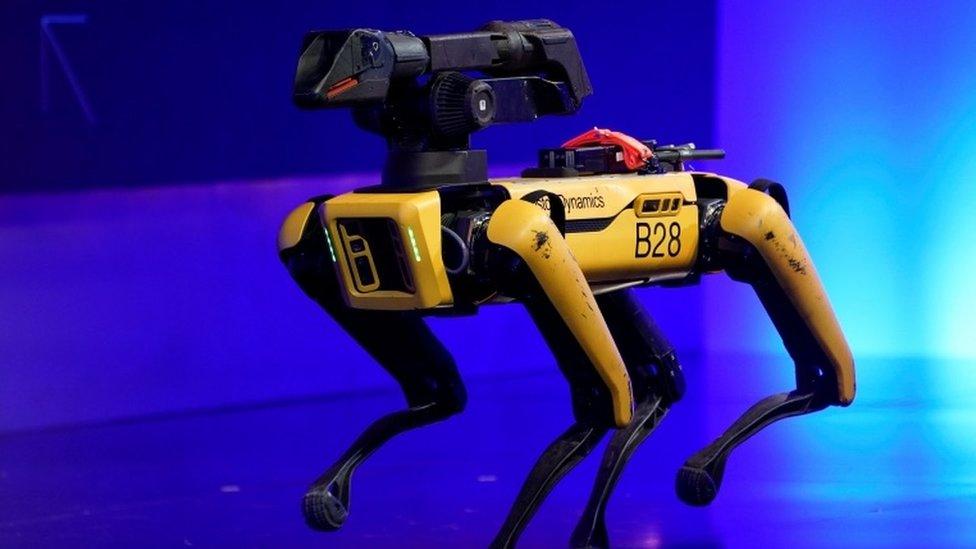Boston Dynamics boss learned by unbalancing toddler
- Published

Boston Dynamics's quadruped robot, Spot, can be leased at the same cost as a luxury car
The boss of robotics company Boston Dynamics has confessed he once nudged his one-year-old daughter over to work out how people balance.
A YouTube video of Marc Raibert's humanoid robot Atlas remaining upright while being poked with hockey sticks has 34 million views.
He no longer knocked his robots over just to show people they could get themselves back up again, he said.
But when he had done so, it was because he had felt like a "proud parent".
"In fact, I have video of pushing on my daughter when she was one year old, knocking her over, getting some grief," he told ҙуПуҙ«ГҪ News, at Web Summit in Lisbon.
"She was teetering and tottering and learning to balance and I just wanted to see what would happen. But we're still good pals."
WATCH: Atlas and Spot robots' skills are put to the test
Boston Dynamics began by designing robots suitable for military use but is now seeking to lease them to industries such as oil, gas and construction.
And Mr Raibert told ҙуПуҙ«ГҪ News he had had more than 3,500 queries about leasing its quadruped robot, Spot - at the same cost as a luxury car.
The company, which has yet to make a profit, was once owned by Google's parent, Alphabet, but has since been acquired by Japan's Softbank Group.
"If you look at our YouTube videos, it's always above a 95% thumbs-up from our followers," Mr Raibert told ҙуПуҙ«ГҪ News.
"I take that as a sign people are positive about what we are doing.
"When people see the robots at conferences, they want to take selfies, people want to pet the robot.
"So that's a positive thing.
"On the other hand, if you read the media, blogs and stories about our stuff, the words 'creepy' and 'terrifying' are in the titles and I'd like to know if that's based on any real information from the public."
Co-founder of Boston Dynamics Marc Raibert is often at technology conferences, explaining his work
Mr Raibert himself once called his robots "nightmare-inducing", however - although he now says he was joking.
"I was teasing myself and the media when I said it," he told ҙуПуҙ«ГҪ News.
"It was supposed to be a closed meeting with no media and I was joking among a crowd of friends. I was teasing us and them."
Boston Dynamics robots are among the most sophisticated in the world - but for time being, the company is content with developing "athletic intelligence" rather than integrating cognitive artificial intelligence.
As for the increasingly vocal debate about the how robots will work alongside humans in future, Mr Raibert said others had more expertise.
"I'm interested in getting the robots to do stuff," he said, "really functional stuff - mobility dexterity, perception in the world so they can manoeuvre.
"Those are the key functionalities that will make robots interesting and useful."